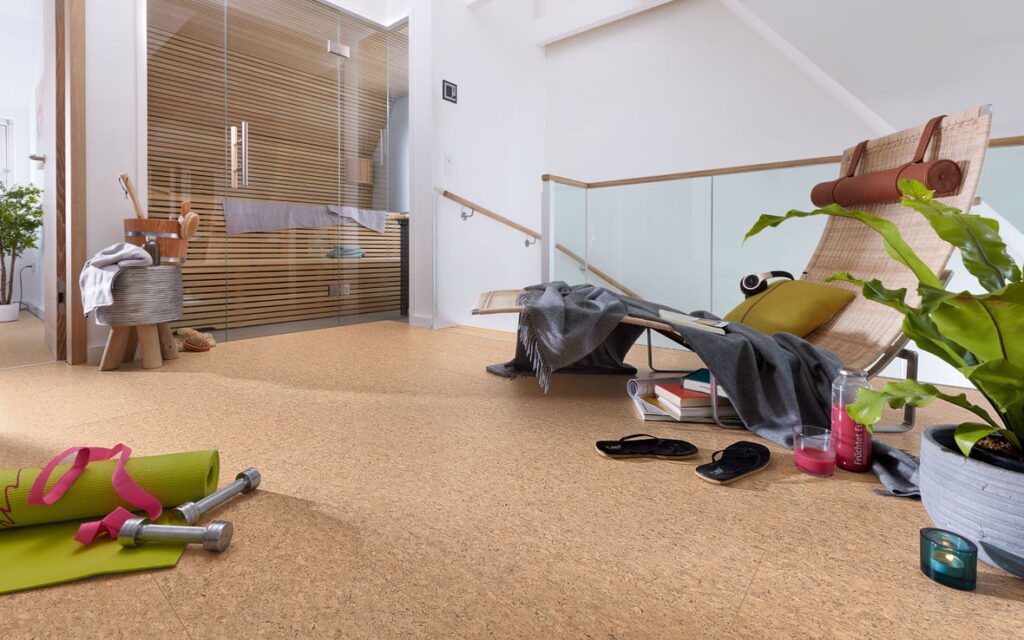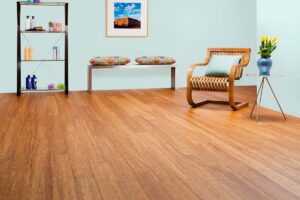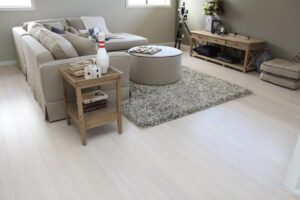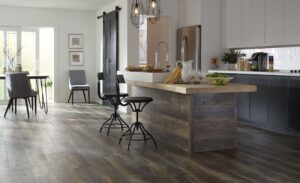If you are thinking about having a cork flooring at home, don’t forget to weigh in cork flooring review pros and cons. This is the reason why you should read tons of reviews from previous users, so you can learn about the good things (of the floor) and be ready for the downsides.
Cork flooring is relatively popular these days and the popularity is increasing from day to day. But you should also remember that such a floor isn’t for everyone.
Look into your own needs and requirements, and then consult the reviews, so you won’t be disappointed with the quality outcome of the floor.
Green Nature of Cork Flooring Pros and Cons
One of the likable features about cork flooring is the renewable and green features. When talking about cork flooring review pros and cons, the renewable factor is definitely on the positive side.
Unlike hardwood flooring made from tree logs, the cork is made from cork tree’s bark. You see, when you make hardwood flooring, you have to cut down a tree and then process the logs to get the hardwood outcome.
However, the cork tree usually shed its own bark once every 9 years and then the bark will grow again which can be harvested again in the following 9 years. You can get the bark without cutting down a tree.
Because of this, cork tree is considered ideal for home improvement project and the eco-friendly trait is great for those environment conscious homeowners who don’t want to be guilty having beautiful flooring at home.
After the bark is harvested and collected, cork will be turned to ground form and then compressed. It is then bonded together with resins to create sheet forms. This is the reason why cork is completely a recurring, natural, and replenishable material.
Another cool thing about the cork flooring is the biodegradable property. It means that the cork will break down and won’t waste the environment once it has reached its own life cycle.
Cork flooring seems like an ideal option, right?
But then again, you need to realize that such a floor isn’t for everyone. You need to understand the characteristics of the floor to determine whether it is the right option for you or not.
That’s why you need to understand its natural properties before making a decision. And you can learn about the floor from cork flooring review pros and cons.
The Cost of Cork Flooring
When you consider cork tiles or planks, expect to spend around $2 to $12 for a square foot. Naturally, the price depends on the quality, thickness, and finish quality of the material.
Don’t forget that you still need to consider the installation cost too. Price (and cost) matter are crucial in cork flooring review pros and cons. When you have to add in the installation cost, add between $1 and $2 a square foot.
Again, the cost depends on the quality of finish and the service charge of the installer. The more professional they are, the higher the cost will be.
Basically, the average and standard cost for a room of 100-square foot is around $950 meaning that it is around $9.50 a square foot. It is almost similar to bamboo flooring cost.
When compared to bamboo or hardwood flooring, cork flooring installation offers a pretty simple and straight forward DIY work.
For homeowners with limited budgets, cork flooring provides an alternative cheaper option for beautiful finish that won’t hurt your wallet.
Read Also: Is It Possible to Have Your Own Stylish Cork Flooring for the Home?
Cork Flooring Maintenance, Cleaning, and Care
When you install the cork flooring at home, make sure to use quality sealer on the surface. Apply several layers of it and you should be good to go.
The sealer is included in the finishing process so there is (invisible) barrier on the surface that will protect the floor against water damage and stain. For regular maintenance and care, you only need to use a regular broom to sweep the floor.
If you want to use the vacuum, make sure to use the regular sucking mechanism and DON’T use the abrasive brush. Use a damp mop to clean the floor, removing the small dirt and grit particles.
When you have water spills, immediately remove them by wiping them off right away. It would prevent staining.
You also need to re-apply the seal regularly to keep the floor on its pristine and good condition. Don’t saturate or flood the floor with water. Wet mop isn’t advisable either.
Be aware of humid surroundings as humidity is the main enemy of cork flooring. When it is humid, the planks may buckle or the tiles pop out. Based on cork flooring review pros and cons, the floor isn’t suggested for basements, bathrooms, or kitchens.
If you have pets, be aware. Cork flooring may not be the best option because their nails will definitely scratch the floor. Although you can always have their nails trimmed, pets are likely creating different levels of damage to the floor.
Heavy furniture will also cause dents or divots on the floor. You can avoid it by using support structure or platform to place the heavy furniture.
You can also use furniture pads. Removing and regulating the furniture on a regular basis can also prevent permanent dents or divots.
Direct sunlight can also create damage on the floor. It can fade the color and the heat can make the floor to peel off. If you place the cork flooring on rooms getting continuous sunlight, discoloration may happen.
You can prevent such a thing by placing a rug on the floor, protecting and covering the floor. Another possible way to block and filter the light is to use blinds and curtains.
Or have a good window treatment (such as installing window film) for the extra work.
Cork Flooring Designs and Styles
Traditional cork has this natural and warm look that would match best with casual and informal decor. But modern manufacturing process and techniques are able to create modern cork flooring with various designs and styles.
Many of the designs can imitate the look of concrete, marble, hardwood, and stone. You don’t even have to spend a lot of money to create a beautiful finish. And if you are creative enough, you can create custom look and designs.
Although cork flooring is tough and durable, it would finally show small signs of dings and scratches.
That’s why such a floor is perfect for places where vintage look is more appreciated and welcomed.
The Installation of Cork Flooring
There are different types of cork flooring forms. Feel free to choose the solid tiles with glue-down application. This one is similar to vinyl tiles installation.
Another one is the newer laminated planks coming with lock-lock edges which are perfect for floating floor method. Cork flooring is generally installed over the (thin) foam underlayment layer or pad.
It is advisable to have prefinished process. But if you don’t do it, make sure to have a coating layer on the already installed floor. Have several layers, if possible.
Cork Flooring Pros Convenience and Comfort
If you read cork flooring review pros and cons, convenience and comfort are some of the positive traits to expect from cork flooring. It feels soft and somewhat plush on your feet. Cork is more suitable for rooms where plush effect and softness matter.
Kitchens are the perfect rooms because you will likely stand for a long time doing the cook preparation. Yes, kitchens are prone to spills and splash, but if you can have superior sealer for the floor, you can make it water resistant and the kitchens can last for a long time.
Kids’ rooms and playrooms can also benefit from the soft surface. The floor has this nice cushiony feel that will make the floor soft ideal for those who are often falling or tripping. Rough playing can benefit from the floor installation. Older residents can also make use of the floor.
Cork contains suberin a special waxy substance that can repel small insects and vermin naturally. Because of this property, cork flooring is ideal for those with allergies.
If you are afraid that organisms and insects will grow and breed on the floor, such a thing won’t happen. This is also the reason why cork flooring is ideal to encourage healthier environment another positive side in cork flooring review pros and cons matter.
Cork has its own natural insulating property because of its special characteristics. You see, the material consists of many small chambers that are air-filled acting as a shield or barrier against the heat and noise transmission. It creates effective insulation effect.
That’s why the cork flooring is great to absorb noise. It is also great to regulate temperature, saving you cooling and heating bills.
Read Also: iCork Flooring Review – Understanding the Perks of Cork Flooring
Final Words Cork Flooring Pros and Cons
Cork is the perfect pick for homeowners who want to get attractive, casual, and warm flooring vibe resulting to informal, homey, and comfy look. If you want a perfect pristine look, then cork won’t be the perfect option.
Moreover, cork flooring will definitely develop wear patina gradually over time. That’s why consulting cork flooring review pros and cons is crucial if you want to learn its benefits and then decide whether it is the right floor for you.





